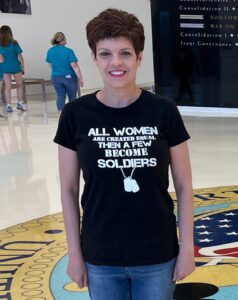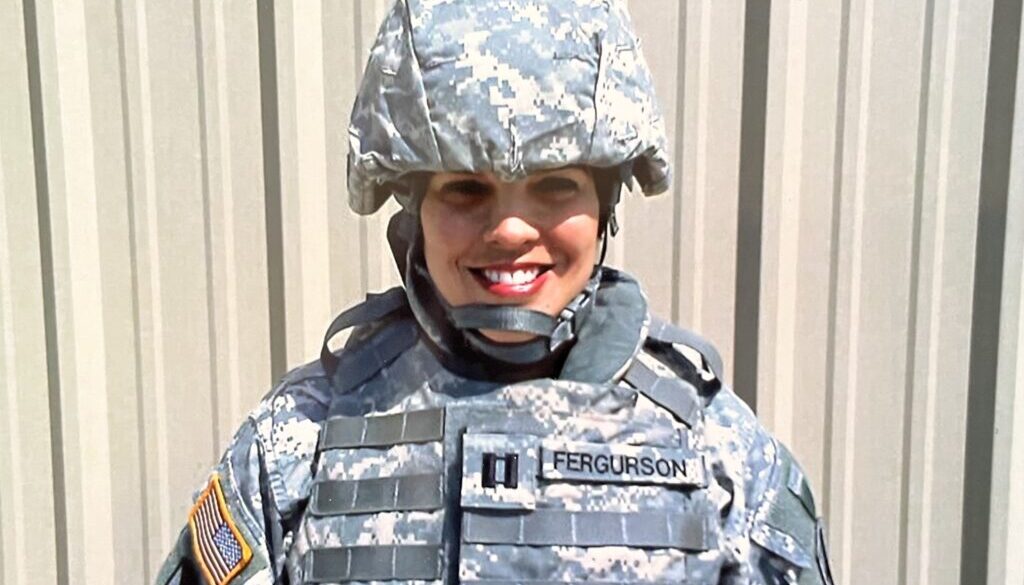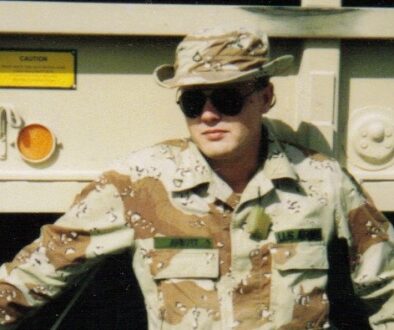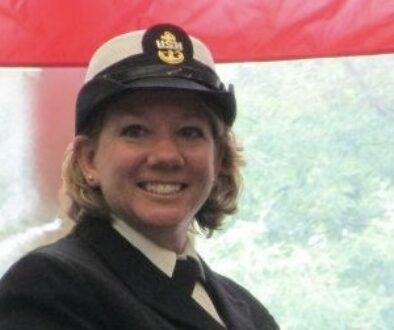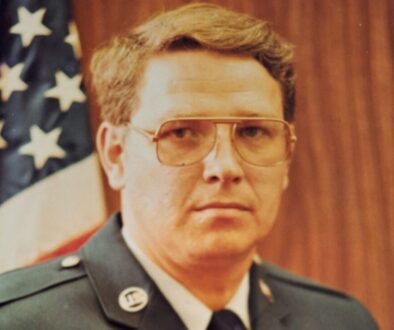Captain Olena Fergurson, U.S. Army (Retired) – Service, Sacrifice, and Resilience
When men and women join today’s military, they have no way of knowing what sacrifices their service may entail or what fate may have in store for them. Despite this uncertainty, they willingly commit to serving our country, no matter the personal cost. For this reason, they deserve our respect and have earned the right to be called heroes, whether they train troops in Georgia or end up in harm’s way somewhere across the globe. Captain Olena Fergurson, U.S. Army (Retired), is one such hero. After leading troops stateside for years, she volunteered for service in Iraq. Five months later, the C-130 transport plane she was flying in crashed in the Iraqi desert. This is her story.
Olena’s mother and father immigrated to the United States with their parents in the aftermath of World War II. In fact, her mother was born on the ship bringing her from Europe to the United States as it crossed the Atlantic Ocean. Her father, who was from Lviv, Ukraine, came to America via England, and both her parents entered the United States through Ellis Island. They grew up, met, and were married in Cleveland, Ohio, which has a significant Ukrainian American community.
Olena was born in Cleveland in 1970, and her little brother followed three years later. On Saturdays, both attended Ukrainian school to learn about their family’s heritage and Ukraine’s culture, history, literature, and geography. They also learned the Ukrainian language and were fluent in both English and Ukrainian, a skill that would help Olena during her military career.
When it came time for high school, Olena attended Padua High School, a Franciscan high school in Parma, Ohio. She played soccer on a team her father coached in a Ukrainian American Soccer League. She also started working at Dairy Queen when she was sixteen, but the summer job she enjoyed most was working at the Cleveland Zoo. She started out making snow cones but soon promoted to operating a small gift shop by herself. The jobs gave her the spending money and independence she needed to have a little fun throughout the school year.
After graduating from Padua High School in June 1988, Olena enrolled at Cleveland State University in the fall. Her college experience began typically in that she majored in psychology and joined the Sigma Kappa sorority. However, at the end of her sophomore year, she decided to enlist in the Army Reserve, a decision she had thought about for some time. Her uncle, Jon Nych, who had been a Marine in Vietnam, was a major influence on her, but the primary reason she enlisted was the pride she and her parents felt about being U.S. citizens. America opened her doors to Olena’s family and allowed them to escape the Bolsheviks taking over Ukraine after World War II. For them, American citizenship was better than winning the lottery – it offered opportunity and a chance to live in freedom. Olena saw her enlistment as a way to say “thank you” to America on behalf of her and her parents. Military service was something she was passionate about.
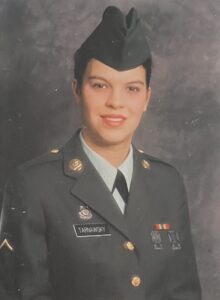
Olena knew she could participate in ROTC while attending Cleveland State and be commissioned an Army officer upon graduation. However, she also wanted to serve as an enlisted soldier, working her way up through the ranks and having all the same experiences as the soldiers she would someday lead as an officer. The Army had the solution – the Simultaneous Membership Program (SMP). The program allowed Olena to join the Army Reserve and attend basic training and Advanced Individual Training, then return to school to finish her degree and earn her commission through ROTC. The SMP had the added benefit of paying Olena for her reserve duties and helping her accumulate retirement points, but the program’s main benefit was it furthered Olena’s goal of serving her country in the Army.
Olena formally enlisted as part of the SMP on May 29, 1990. Then, instead of beginning her junior year at Cleveland State in the fall, she reported on August 15 for basic training at Fort McClellan in Anniston, Alabama. The timing was significant because just thirteen days before, on August 2, Operation Desert Shield began as the United States started building up forces in the Middle East in response to Iraq’s invasion of Kuwait. Olena had previously convinced her parents not to worry about her Army commitment because the United States was not at war when she enlisted. Now, with war on the horizon, her parents were concerned for her safety. In contrast, Olena hoped she could complete her training in time to contribute to the U.S. war effort.
Basic training at Fort McClellan began with in-processing in a large auditorium. Afterwards, the new recruits were issued their uniforms and their bed linens. They also had to go through an initial physical fitness screening, which Olena passed with flying colors. She had started running and working out in preparation for basic training at the time she enlisted, so she was in great shape by the time she arrived. Her physical conditioning, coupled with coming from a strict Ukrainian Catholic family, prepared her well for the challenges she would face and she excelled.
Still, basic training was no walk in the park. Like her male counterparts, Olena trained on the M16 rifle, did KP (“kitchen police”), learned how to use a bayonet, and had to crawl through the mud under barbed wire while live fire whizzed overhead. During one pugil stick training event, Olena was randomly paired to fight against her best friend. Initially, they were afraid to hit each other, but after the drill sergeant told them everyone would have to do pushups if they did not fight hard, they beat each other mercilessly with the giant Q-tip like batons until the drill sergeant was satisfied. No one had to do pushups.
Olena graduated from basic training in October 1990. Her mother and her Uncle Jon surprised her by showing up at the ceremony, making it even more meaningful. After graduation, Olena went directly to Advanced Individual Training (AIT) at Fort Jackson in Columbia, South Carolina. While she had hoped to go directly into the medical field, the timing was wrong and she could not get a slot. Instead, she became an Administrative Specialist with a Military Occupational Specialty (MOS) designation of 71L. As an Admin Specialist, her job would be to perform clerical functions for whatever command she was ultimately assigned to.
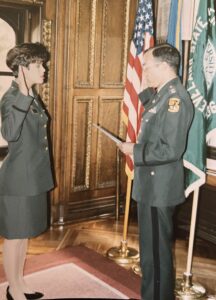
Near the end of December 1990, Olena completed AIT and reported as a newly minted private (E-2) to her first reserve command, the 256th General Hospital in Cleveland, Ohio. The command’s location allowed Olena to return to Cleveland State University for the 1991 spring semester while drilling one weekend each month and two weeks out of the year with her reserve unit. In addition, she enrolled in Cleveland State’s Army ROTC program, paving the way for her to become a commissioned officer. This meant she pulled double military duty, drilling with the 256th General Hospital and training with Cleveland State’s ROTC unit. Furthermore, when the 256th General Hospital needed her, she had to miss classes and learn her college course material on her own. She also took an active role in the transition of the 256th General Hospital to the more mobile and responsive 256th Combat Support Hospital (CSH). Finally, during the summer break between her junior and senior years, she attended Army Basic Leadership Skills training in the field at Fort Bragg, North Carolina, as part of her ROTC requirements. While these obligations made her last two years of college more challenging, Olena was fully committed to both her education and the Army. She did whatever it took to make everything work.
Olena graduated from Cleveland State on May 28, 1994, with a bachelor’s degree in psychology. On that same day, she traded in her sergeant stripes for an officer’s commission as a 2nd lieutenant (O-1) in the U.S. Army Reserve. Her position at the 256th Combat Support Hospital changed, too. Instead of being an enlisted Admin Specialist, she was now the hospital’s Admin Officer, known as the “S1” in Army parlance. That meant she was responsible for managing all the hospital’s administrative functions and for leading the Admin Department’s enlisted soldiers.
In January 1995, Olena took a break from her duties at the 256th Combat Support Hospital to attend the Officer Basic Course (OBC) at the Army Medical Department (AMEDD) school at Fort Sam Houston in San Antonio, Texas. There she learned the fundamentals of being an officer in the Army’s Medical Service Corps. More specifically, she learned the administrative side of Army healthcare, including how to oversee patient care and how to run hospitals and other medical units. Once she completed the training in late April 1995, she was officially designated a Health Services Administration Officer.
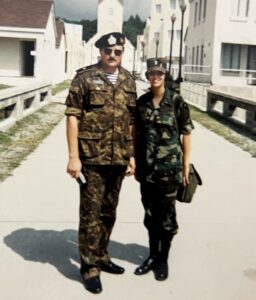
Ironically, Olena’s first assignment after OBC had nothing to do with her newly earned qualifications. The assignment stemmed from a message her mother received from a colonel at the Pentagon about two weeks before Olena’s OBC course ended. After confirming Olena’s fluency in Ukrainian, the colonel asked Olena’s mother to have Olena call him as soon as she completed the OBC course. This she did and she soon found herself assigned for a month as an interpreter for Rear Admiral Nikolay Kostrov of the Ukrainian Naval Infantry, whose unit was participating in a Partnership for Peace exercise with U.S. Marines at Camp Lejeune, North Carolina.
Once her interpreter assignment ended, Olena returned to the 256th Combat Support Hospital. In addition to her normal duties as the hospital’s Admin Officer, she represented the command in the Army Ten-Mile Race for both 1995 and 1996 and assisted with physical exams and blood draws at the Louis Stokes Cleveland Department of Veterans Affairs Medical Center. Then in 1996, her language skills again proved useful as she was asked to be an interpreter for a military intelligence unit in Sterling Heights, Michigan. She drilled with the unit for two years and in her off time began working on her master’s degree in education and counseling at Cleveland State University. She completed her assignment with the military intelligence unit in 1998 and transferred to the Individual Ready Reserve (IRR) to give her a full year to complete her master’s degree. She earned her advanced degree in May 1999 after completing her thesis and the required clinical work.
With her new degree in hand and now a 1st lieutenant (O-2), Olena received active duty orders to report to Womack Army Medical Center at Fort Bragg, North Carolina, in August 1999. There she served as a healthcare administrator working alongside doctors and nurses to provide quality medical care to soldiers and their families. She remained in this assignment through the turbulent days after the September 11, 2001, terrorist attacks on the World Trade Center towers and the Pentagon. In 2003, she received orders to report to the hospital on MacDill Air Force Base in Tampa, Florida, and subsequently to Fort Buchanan and Camp Salinas in Puerto Rico to help prepare members of the Puerto Rico National Guard for deployment to Afghanistan.
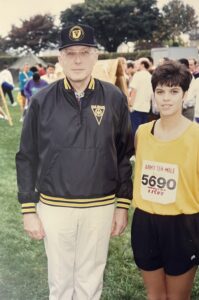
After her assignment in Puerto Rico, Olena went off active duty and returned to Cleveland. To maintain her reserve affiliation, she drilled with the 785th Military Police Battalion in Fraser, Michigan, and promoted to captain (O-3) shortly after beginning her assignment as the unit’s Medical Service Corps Officer. At the same time, the U.S. was engaged in wars in both Afghanistan and Iraq and needed officers to support the war efforts. As a result, in 2006, Olena again received active duty orders for duty at Womack Army Medical Center at Fort Bragg. She was subsequently considered for deployment with a civil affairs and psychological operations command (CAPOC) unit in either Iraq or Afghanistan, but AMEDD would not allow her to leave her current assignment. Accordingly, she continued to work at Womack Army Medical Center, including teaching and certifying combat life saver skills to 1600 troops preparing to deploy to Iraq. She remained at Fort Bragg until her active duty period ended in 2007.
After her assignment at Womack, Olena heard the Army Materiel Command at Fort Belvoir, Virginia, needed officers for work in Iraq. Olena volunteered and her request was approved. She reported to Fort Belvoir on January 2, 2008, and prepared to deploy for a year as an individual mobilization augmentee (IMA), which meant she would deploy as an individual for a specific job in Iraq rather than deploy as part of an intact unit. After about a month of training for her new job as a logistics support officer (LSO), she boarded a flight to Ali Al Salem Air Base and Camp Buehring in northwestern Kuwait where she completed in-processing. Then she flew on a C-130 transport plane from Ali Al Salem to Baghdad in Iraq, where she worked at Camp Slayer.
Olena’s responsibilities at Camp Slayer were significant. As an LSO, she was responsible for making sure the combatant commanders had everything they needed to support their troops. To do this, she prepared statements of work for contractors like Kellogg, Brown & Root so they could fulfill the combatant commanders’ requirements. Examples of projects she worked on included constructing dining hall facilities, expanding containerized housing units, and arranging major repairs to shower facilities. Many of the items involved significant quality of life issues for the troops, who were conducting their missions in the harsh Iraqi desert environment.
In June 2008, Olena agreed to relieve a fellow LSO in Kuwait for a few days and then return to Baghdad to continue her work. She and thirty-three other passengers took off around noon from Baghdad International Airport in a C-130 transport plane. About sixty seconds into the flight something went wrong and three of the airplane’s four engines lost power as the aircraft struggled to gain altitude. The pilot tried to put down the plane’s landing gears but there was insufficient time for them to extend all the way.
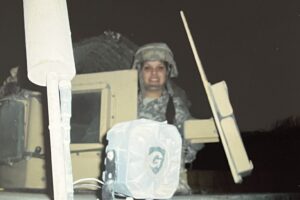
Olena, who had always had an intense fear of flying, noticed the face of one of the plane’s crewmembers cringe and his hands tighten their grip on his seat. She felt the plane going down and thought it must have been hit by an insurgent anti-aircraft missile. Suddenly, the giant plane slammed onto the ground doing around 160 knots (184 mph). Because the landing gears had not fully extended or locked in place, they thrust upwards when the plane hit the ground, splitting apart the floor of the cargo bay where all the passengers were seated. Gear flew about and pummeled the passengers as the plane slid across the Iraqi desert. Olena looked at pallets at the rear of the cargo bay and feared they would break loose and crush everyone still strapped into their seats, but they held fast. Then everything went eerily silent.
At first, the crew could not open the cargo bay doors because they were jammed. Olena saw a fire as she looked around, as well as sand that had entered the plane through its cracked underbelly. She thought they would be trapped inside and burn. The crewmembers finally pried the doors open and all thirty-four stunned passengers and four crewmembers escaped from the downed aircraft.
No one knew exactly where they were other than they were in hostile territory outside Baghdad’s Green Zone with only four small weapons. The crew set up a defensive perimeter and soon saw Iraqis approaching with a white flag – they turned out to be the Iraqi police. Then Apache helicopters started flying overhead to protect the area and everyone knew they would be safe. Miraculously, no one was killed in the crash.
Once ground forces were flown in to protect the crash site, Olena and the other passengers were flown on Blackhawk helicopters to Sather Air Base on the west side of Baghdad International Airport. Although Olena displayed no apparent injuries, she complained of a very bad headache. This did not raise concerns at the time and she was returned to her workplace at Camp Slayer.
Olena picked up her duties where she left off before the flight, but it soon became clear the injury she suffered was more than just a headache. Each day, she progressively began to display more and more symptoms consistent with traumatic brain injury (TBI). Not recognizing the symptoms’ cause or implications, Olena’s command sent her back to Army Materiel Command headquarters at Fort Belvoir, where she worked for two months as her symptoms continued to worsen. Finally, a medical professional at the base clinic traced the origin of the symptoms to the crash and Olena was sent to Walter Reed National Military Medical Center in Washington, DC, where the diagnosis of TBI was confirmed.
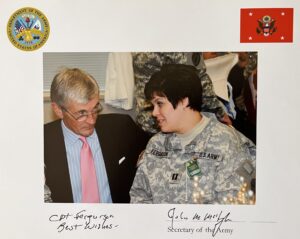
To address her TBI, Olena was transferred to the Warrior Transition Unit at Walter Reed. Over the next two years, she received treatment for her injuries, including physical therapy, occupational therapy, and multiple surgeries on her neck and spine, and had the opportunity to work at the Defense Threat Reduction Agency (DTRA). The ordeal also gave her the opportunity to meet other wounded warriors at Walter Reed and Army leaders at the Pentagon (including the Secretary of the Army), all of whom inspired her and helped her forge the positive attitude she needed to navigate some of the toughest days of her life. She and other wounded warriors even got to attend President Barrack Obama’s inaugural ball in January 2009. Finally, in December 2009, Olena was released from the Warrior Transition Unit. She subsequently retired from the Army Reserve in November 2010 after over twenty years of distinguished service and began her life as a civilian.
Although Olena’s Army days are behind her, she continues to support the U.S. military. She actively participates in Post 24 of the Ukrainian American Veterans and Chapter 8 of the Ukrainian National Women’s League of America. As she looks back over her service, she is proud of what she accomplished and the crucial role women play in today’s military, sacrificing and serving in every capacity to further our nation’s defense. She is also proud of her resilience after being seriously injured in the C-130 crash in Iraq, doggedly sticking with her treatment and therapy programs until she overcame her injuries. She hopes her story will serve as a light to others who have suffered similar trauma, offering a promise of hope that they, too, can overcome their injuries. In that sense, Olena’s life fulfills a dream she had of pursuing a doctorate to counsel military members struggling with life’s complex issues, albeit through a slightly different means than a PhD.
Voices to Veterans is proud to salute Captain Olena Fergurson, U.S. Army (Retired), for her many years of dedicated service to our country. Over her twenty-year career, she helped countless soldiers and their families get the medical care they needed and ensured units deploying to Iraq and Afghanistan had the medical training they required. When the Army needed officers to serve in Iraq, she willingly volunteered to go into harm’s way. She survived a major plane crash in hostile territory and pulled herself through a long and difficult recovery period, only to continue serving veterans in her community. We thank Olena for all she has done and wish her fair winds and following seas.
If you enjoyed Olena’s story, please sign up for the Voices to Veterans Spotlight monthly newsletter by clicking here. Once each month, you’ll receive a new written veteran’s story directly in your mailbox. Best of all, it’s free and you can unsubscribe at any time.
